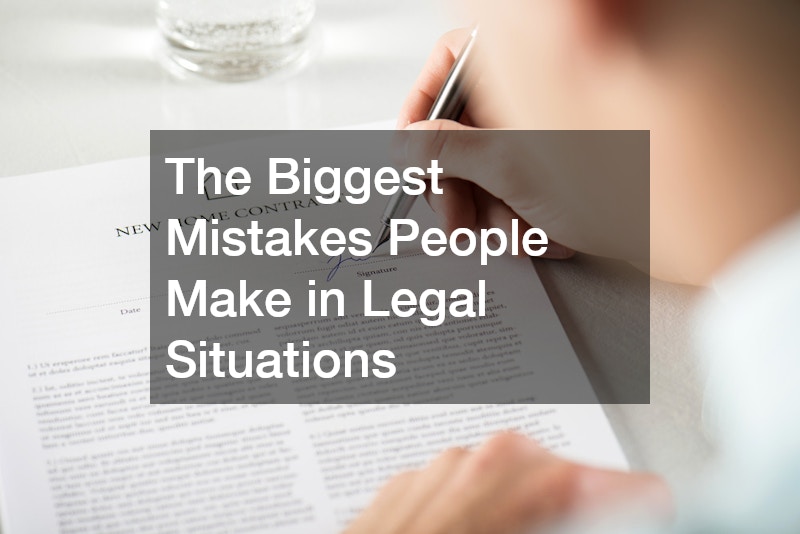Legal situations can be overwhelming, stressful, and confusing—especially for individuals with little or no experience in the justice system. Whether you’re facing criminal charges, dealing with a civil dispute, navigating family law issues, or responding to unexpected legal notices, every action you take can significantly affect the outcome of your case. Unfortunately, many people make avoidable mistakes simply because they don’t understand the legal process or underestimate its seriousness. These missteps can lead to delays, financial consequences, damaged credibility, or even long-term legal penalties.
One of the biggest challenges individuals face is the pressure to respond quickly. The legal system often imposes strict deadlines, and failing to meet them can result in automatic judgments or lost opportunities to defend yourself. At the same time, rushing into decisions—such as giving statements, signing documents, or representing yourself without proper guidance—can cause irreversible harm. In many cases, people unknowingly give up their rights, sabotage their defense, or complicate matters that could have been handled more effectively with professional help.
Another common issue is the misconception that the legal system is intuitive or fair by default. Many believe they can explain themselves, rely on common sense, or navigate the process the same way they manage everyday conflicts. Unfortunately, legal matters require strategic thinking, a strong understanding of statutory requirements, and awareness of potential long-term implications. Simply put, what seems harmless or reasonable outside the courtroom may be disastrous inside it.
This article examines the biggest mistakes people make in legal situations, explains why these errors are so harmful, and offers guidance to help avoid them. By becoming aware of these pitfalls and taking a proactive approach, you’ll be better prepared to protect your rights, strengthen your case, and achieve more favorable results in any legal challenge.
1. Why Is It Important to Avoid Giving Verbal Statements?
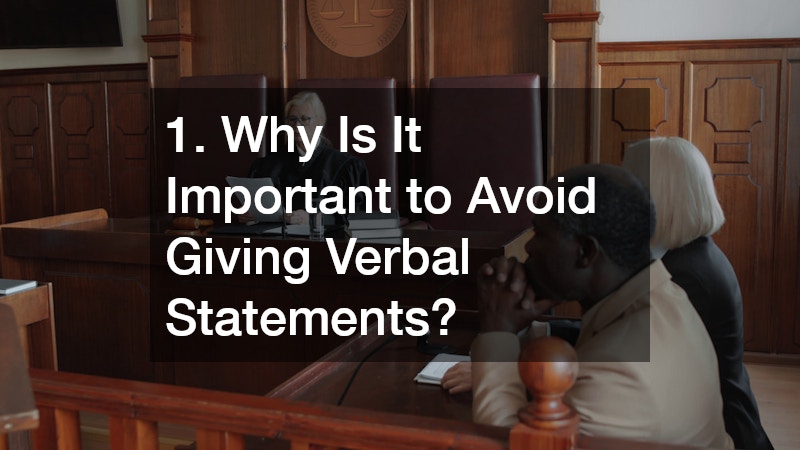
Many people believe that explaining their side of the story will help clear things up. Unfortunately, offering verbal statements—especially without legal guidance—can be one of the most damaging decisions you make. In the legal world, your words can be used against you, taken out of context, or interpreted in ways you never intended.
When speaking to police officers, investigators, insurance representatives, or opposing attorneys, individuals often feel pressured to respond quickly or politely. They may assume that cooperating fully by giving a statement will demonstrate innocence. However, criminal defense lawyers consistently warn that even innocent people can harm their cases by saying too much. Subtle details, inconsistencies, or assumptions can later be used as evidence of wrongdoing or dishonesty.
Furthermore, law enforcement professionals are highly trained in interviewing and interrogation techniques. They understand how to ask questions that elicit responses which strengthen their case—not yours. Once a statement is given, retracting or clarifying it becomes incredibly difficult.
The best course of action is simple and legally protected: remain silent and request an attorney. This is not an admission of guilt—it is a constitutional right designed to protect you.
2. Should You Sign Documents Without Legal Advice?
Legal documents are often complex, filled with dense language, and binding once signed. Many people sign paperwork because they feel rushed, intimidated, or unaware of the long-term consequences. This is especially common when dealing with settlement forms, release waivers, plea deals, or contracts.
A criminal defense law office will always advise clients never to sign anything without professional review. Even seemingly minor documents can include clauses that waive rights, admit fault, or impose financial obligations. In criminal cases, signing a confession or plea agreement without legal counsel can lead to harsher penalties than necessary. In civil matters, signing a settlement may prevent you from pursuing additional compensation later.
Legal professionals know how to evaluate wording, interpret obligations, and identify red flags. They can explain what the document truly means—not just what it appears to say. Taking the time to seek advice can prevent irreversible mistakes that jeopardize your case or financial well-being.
3. What Are the Dangers of Self-Representation?
While people have the right to represent themselves in court, doing so is rarely wise. Legal procedures are technical, rules of evidence are strict, and the opposing side may have experienced attorneys ready to challenge your every move.
Many individuals attempt self-representation because they want to save money or believe their case is straightforward. However, without the training and experience of criminal attorneys, it’s nearly impossible to navigate the system effectively. Judges expect all parties—represented or not—to follow the same procedural standards. Missing a filing requirement, misunderstanding court etiquette, or failing to introduce evidence properly can weaken or destroy your case.
Additionally, emotions often cloud judgment. When representing yourself, it’s harder to remain objective, negotiate effectively, or make strategic decisions. Hiring an attorney is not just about having someone speak on your behalf—it’s about gaining access to legal knowledge, negotiation skills, and procedural expertise that significantly enhances your chance of success.
4. How Does Mishandling Evidence Impact Your Case?
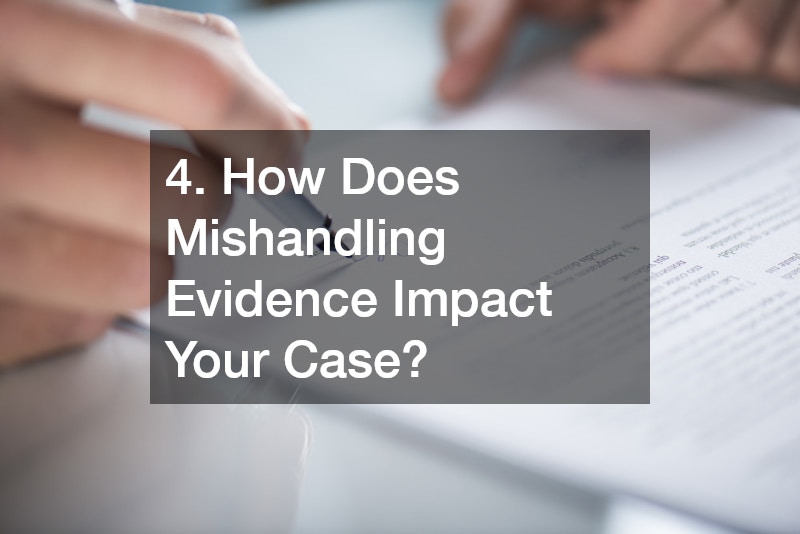
Evidence is the backbone of any legal case. Mishandling it—whether intentionally or accidentally—can severely damage your credibility and legal standing. In some situations, it can even lead to additional charges.
Common mistakes include losing evidence, altering documents, disposing of items, or failing to store materials properly. These actions can create the perception of guilt or dishonesty. Even more harmful, mishandling digital evidence such as text messages, emails, or photos can result in claims of tampering.
A criminal law lawyer knows how to preserve, collect, and present evidence in a way that supports your case. This includes following rules of admissibility, maintaining proper chains of custody, and documenting the source of each item. Without professional guidance, improperly handled evidence may be excluded entirely—leaving your case without support.
5. Why Is It Critical to Meet All Legal Deadlines?
Missing a legal deadline can destroy your case before it even begins. Courts operate on strict schedules, and failure to comply can result in penalties, dismissal, or default judgments.
Deadlines apply to filing court documents, responding to motions, submitting evidence, and attending hearings. If you miss a required date, the judge may assume you are uninterested or irresponsible—even if the delay was unintentional.
A drug crimes attorney works carefully to track all deadlines and ensure timely submissions. When individuals handle matters alone, they often underestimate the importance of prompt action or become confused by unfamiliar procedures. Because deadlines vary depending on the type of case and jurisdiction, having professional guidance eliminates the risk of costly mistakes.
6. Is Ignoring Legal Notices a Serious Error?
Ignoring legal notices is one of the biggest mistakes people make. Many individuals avoid correspondence from courts, attorneys, or government agencies because they fear the content or believe the situation will resolve on its own. In reality, ignoring legal notices almost always makes the situation worse.
A notice may inform you of upcoming hearings, requests for documentation, or impending legal action. Failure to respond can result in fines, default judgments, warrants, or forfeited rights.
For example, in accident-related cases, a motorcycle accident lawyer may send notices regarding claims or settlements. Ignoring these can prevent you from receiving compensation or defending yourself properly. Similarly, failure to respond to criminal summonses or civil complaints may lead the court to rule against you automatically.
Always read legal notices carefully, respond promptly, and seek guidance if you don’t understand them.
7. How Can Poor Communication with Attorneys Affect Your Case?
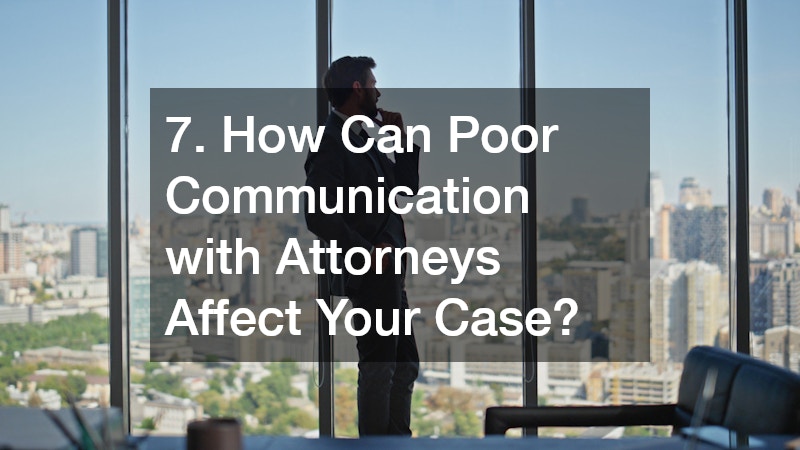
Once you hire an attorney, maintaining open and honest communication is essential. Many clients make the mistake of withholding information, failing to respond to messages, or assuming their attorney can handle everything without their input.
Poor communication delays progress, weakens legal strategies, and creates unnecessary confusion. Attorneys need accurate details to represent you effectively. Even information that seems embarrassing or irrelevant may significantly impact your defense or negotiation position.
A dui attorney, for example, cannot build a strong case without full knowledge of the circumstances, evidence, and timeline. If you forget or avoid sharing key information, your attorney may be blindsided during hearings or negotiations.
To avoid issues, respond promptly, ask questions when unsure, and keep your attorney updated about any changes or concerns.
8. Why Trying to Hide Assets Is a Risky Move?
Some individuals attempt to hide assets during legal proceedings—especially in divorce, bankruptcy, or personal injury cases. This is a serious mistake with severe legal implications.
Courts expect complete transparency, and hiding assets is considered fraud. When discovered, this action can result in fines, penalties, or criminal charges. In civil cases, it can destroy your credibility and lead to unfavorable rulings.
Personal injury lawyers frequently encounter clients tempted to conceal settlements or financial information. Doing so can void agreements, reduce compensation, or result in additional claims of dishonesty.
Honesty is always the best strategy. Full disclosure allows your attorney to protect your interests legally and ethically.
9. What Are the Pitfalls of Relying on Internet Legal Advice?
While the internet offers quick access to information, relying on it for legal advice can be dangerous. Laws vary widely by state, county, and even judge, meaning that what applies to one situation may not apply to yours. Legal outcomes often depend on nuanced details that aren’t covered in broad articles or generalized online posts. Even small differences—such as timing, documentation, or jurisdiction—can completely change how a case is handled.
Online forums, generic articles, and unverified sources often provide incorrect, incomplete, or outdated information. Many of these websites lack professional oversight, and some are based on personal opinions rather than legal fact. Following this advice can put your case at risk, especially if it contradicts the strategy developed by your attorney. Relying on Google searches or social media posts can lead individuals to make serious errors, such as missing deadlines, submitting the wrong forms, or taking actions that unintentionally weaken their legal position.
Local divorce lawyers, for example, frequently encounter clients misled by online myths about custody, property division, or alimony. People may assume that certain outcomes are guaranteed or that a judge will automatically rule a certain way based on what they read online. This misinformation can create unrealistic expectations or encourage harmful decisions, such as refusing reasonable settlement offers or acting out of anger instead of strategy.
It’s perfectly fine to use the internet to gain a basic understanding of legal concepts, terminology, or general procedures. However, it should never replace professional guidance. Every legal case is unique, and only a qualified attorney can assess the facts, review the evidence, and provide advice tailored to your specific situation. Always use online information as a supplement—not a substitute—for personalized legal counsel.
10. How Does Underestimating Emotional Influence Affect Legal Outcomes?
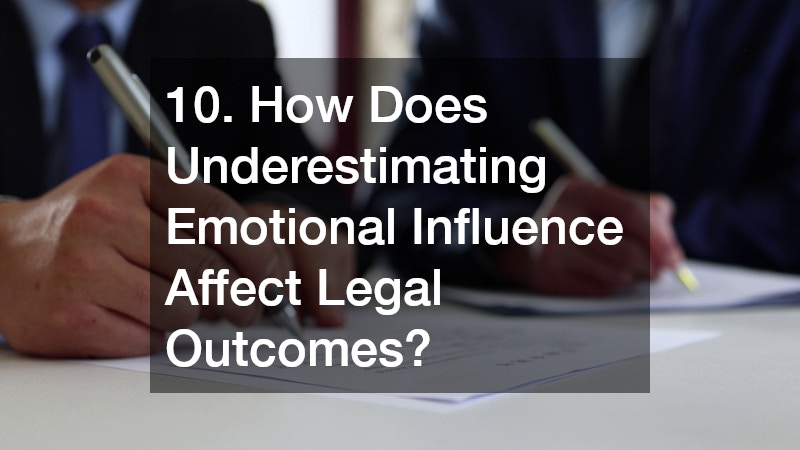
Legal situations are often emotionally charged. Fear, anger, stress, or frustration can lead individuals to make impulsive decisions that harm their cases.
Emotions may cause people to lash out, argue with judges, post damaging content online, or attempt to negotiate without clear thinking. In family law matters, emotional reactions can affect custody, visitation, and property division. In criminal cases, emotional outbursts may be perceived as aggression or instability.
A custody lawyer understands how emotions influence decision-making and can help clients approach their case more objectively. Maintaining composure and relying on professional guidance allows you to navigate the legal process more effectively and strategically.
Avoiding the most common mistakes in legal situations requires awareness, discipline, and a willingness to seek proper guidance. Whether you’re dealing with criminal charges, civil disputes, family matters, or personal injury claims, the decisions you make early on can shape your entire case. By avoiding verbal statements, refusing to sign documents without legal review, and ensuring all deadlines are met, you significantly improve your chances of achieving a favorable outcome.
Maintaining communication with your attorney, responding promptly to legal notices, and avoiding shortcuts—such as hiding assets or relying on internet advice—helps protect your rights and credibility. Ultimately, approaching legal challenges with caution, honesty, and professional support is the most effective way to minimize risks and maximize results. The legal system is complex, but with the right knowledge and preparation, you can navigate it confidently and avoid the pitfalls that often derail cases.
